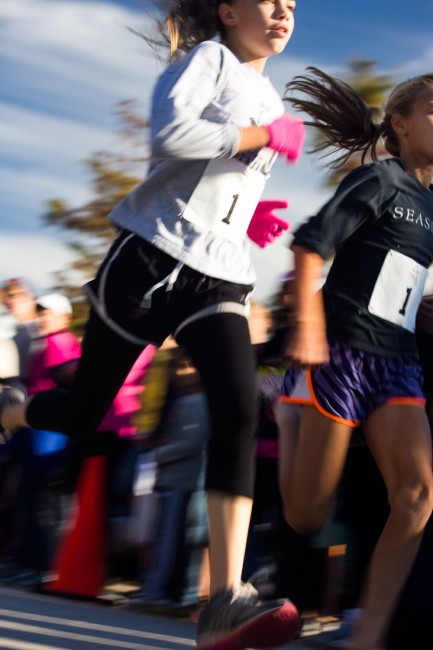Running Buddy
“You have a nose ring?”
“Yeah,” I replied, surprised at these first words from my running buddy. Other girls were hugging, introducing themselves and high-fiving.
She was overweight. She was struggling to clip in one of the strands of fake, neon-blue hair given to each of the girls, and she did not want to run a 5K.

Girls on the Run–Nashville was hosting a practice 5K at a local elementary school before the official race in December, and I signed up to be a running buddy for Thursday afternoon. I haggled with my TA and lab supervisor for Human Biology to be able to keep my 2:45pm commitment, and I caught a ride with a Vanderbilt junior. Together we made small talk as she drove to the school. (I discovered that she was from California and had been a state-level cross-country runner in high school. Of course, I thought. This is a Vanderbilt student. I asked her, “How did you hear about Vanderbilt, since you’re from the West Coast?” She told me that a character in a Nicholas Sparks book was at least planning to be a Vandy student. Who would have guessed?)
When we arrived, the girls were clustered around a table laden with bananas, clementines, water bottles, and adorned with balloons and a colorful sign with all of the girls’ names. A coordinator matched us with our buddies, I was handed a slip of paper with route directions, and eventually the practice began.
She started running. About twenty yards in, she stopped. “I twisted my ankle yesterday.”
Really? I wondered. “We can walk this entire 5K if you want to,” I said. I showed her an exercise to loosen up her ankles.
“My side hurts,” she complained. I directed her to hold her hands on top of her head, because it would stretch out her lungs and help her breathe.
“I hate lungs.”
As we continued to walk, her dad, with six-year-old brother in tow, passed us. “Come on! You can do it! Your brother’s going to beat you!” He was no slim jim himself, as she later remarked: “My dad’s just not made for running. And neither am I.”
She was clearly agonized. She remarked about the other girls: “Jill’s the fastest. She brags that she’s going to win. She beat her running buddy last year. She beat a college student.”
“Wait,” I said, “this isn’t a race. And running buddies are just here to encourage you.”
She whined, “Do we have to do this whole thing? Let’s just turn around.”
“No,” I told her. “We have to finish, no matter how slow we go.”
She said that her parents forced her to do the Girls on the Run program. She said her mom thought she liked the program, and her dad thought she should be able to run a 5K. She said that she didn’t know how to tell them otherwise, even though it must have been painfully obvious to them already.
To this, I said a lot of things. I told her that her parents probably just wanted her to be happy. I told her that you should do whatever exercise makes you happy, or it will be hard to keep doing it for a lifetime. Finally, I told her about the year I took piano lessons, fifth grade. “I hated practicing, so my mom told me that I could quit after completing the first level. So I had to finish that year of piano before I could stop.”
She wanted to skip an out-and-back section of the course, and I wasn’t going to let her, but her dad, who was nearby at the time, said we should just skip it, or we wouldn’t finish before 4:30pm. “You got your wish,” I told her. “I got my wish,” she agreed, satisfied.
When we saw the finish line, I told her, we had to start running. She saw it before I did, and took off. That was the most running we did of the whole (well, not quite a whole) 5K. The girls who had already finished were holding a stream of tissue paper in front of us. I let her finish a half-step ahead of me, let her break the streamer first.
I wanted her to be proud of herself. She couldn’t be, since she hadn’t done what her friends had done or what (she thought) her parents had expected of her. But I was proud of her.